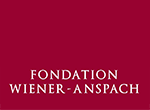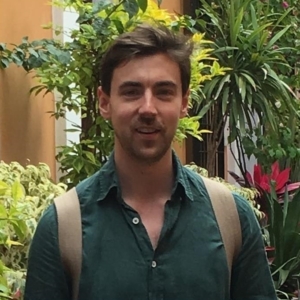 Titulaire d’une bourse postdoctorale de la Fondation à l’ULB de 2014 à 2016, Paul Earlie a eu l’opportunité de travailler avec le philosophe belge Michel Meyer (1950-2022), auquel il rend un hommage touchant.
Titulaire d’une bourse postdoctorale de la Fondation à l’ULB de 2014 à 2016, Paul Earlie a eu l’opportunité de travailler avec le philosophe belge Michel Meyer (1950-2022), auquel il rend un hommage touchant.
What sparked your interest in French thought, your main area of research? Were you an avid reader of French thinkers and writers as a teenager?
Not particularly! As a teenager I read a lot, but mostly literary texts: novels, plays, poetry. In Ireland, you study so many different subjects at secondary school there wasn’t really much time to study anything but the language in our French classes. It was only when I went to university, at Trinity College in Dublin, to study English Literature and French that I started to read more and more of the big French ‘theorists’, Derrida, Foucault, Kristeva, and became instantly hooked. I loved these texts that were so strange to me – so full of theoretical jargon, neologisms, puns and wordplay – and yet which also seemed so relevant to everyday life. Many of my classmates felt the same, though we didn’t know that we then were in the dying days of what was called ‘French Theory’ (Jacques Derrida died in the same month that I started university).
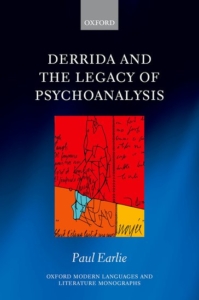 Your doctoral research at the University of Oxford looked at the role of psychoanalysis in the work of Jacques Derrida, and was followed by a book, Derrida and the legacy of psychoanalysis (OUP 2021). What original aspects of this legacy did you want to highlight in your research?
Your doctoral research at the University of Oxford looked at the role of psychoanalysis in the work of Jacques Derrida, and was followed by a book, Derrida and the legacy of psychoanalysis (OUP 2021). What original aspects of this legacy did you want to highlight in your research?
When I had an online book launch last year, one of the speakers, Jean-Michel Rabaté, who is a leading psychoanalytic theorist of culture and a former student of Derrida’s, chided me a little for my title, which he said ought to have been in the plural: Derrida and the Legacies of Psychoanalyses. He was right! In this book, I try to show that one of Derrida’s most important arguments about Freud’s legacy is that it can’t really be reduced to just one thing. It’s everywhere around us: in the language we speak, in the way we understand culture, human relationships, even politics. In the book, I try to show how Derrida uses this richness of Freud’s legacy (or legacies!) to think through issues that were pressing for him and his contemporaries, from the relationship between language and the self to the role of emotions in modern politics. In the same spirit, in writing the book I also tried to think about what Derrida’s work can contribute to debates in the humanities today, and so I set also Derrida’s work in the context of more recent developments, such as the rise of the digital humanities and the recent so-called ‘material turn’.
Following your doctoral thesis, you started looking into another legacy: the influence of Greek sophists on a number of French thinkers. Can you tell us more about your interest in “classical rhetoric and its modern reverberations”?
As part of my doctoral research on Derrida, I began to read some of Plato’s dialogues and was fascinated by these dark figures who are often amongst Socrates’ most eloquent sparring partners. It seemed to me that the sophists’ interest in the power of language to shape our world prefigured in a number of uncanny ways the conclusions of many postwar French theorists of language, so I wanted to think about these reverberations in more detail. I was also drawn to the way in which several French thinkers, in particular Derrida, were subject to the same kinds of hostility as the ancient sophists, to accusations of faulty reasoning, empty verbiage, even corruption of the youth!
From 2014 to 2016 you worked as a Wiener-Anspach Postdoctoral Fellow at the Université libre de Bruxelles. Your host promoter was the late Belgian philosopher Michel Meyer (1950-2022). Did you know him before taking up your position at ULB? And how was working with him, both from a human and a professional perspective?
I had read a little of Michel Meyer’s work before I applied for a fellowship at the ULB and I was also familiar with the journal he edited, the Revue internationale de philosophie, though I had never met him in person. I knew very little about rhetoric at the time, but he embraced my project very warmly and enthusiastically. We often had coffee and lunch together on campus, during which he used to regale me with anecdotes about the great philosophers he’d encountered over the years, starting with Martin Heidegger, who he visited in Freiburg at the tender age of 22… I’ll never forget how Michel and his wife Corinne welcomed me into their home during my years in Brussels, and indeed afterwards. Professionally, Michel taught me so much about academic life. It’s fair to say he probably left me with a very healthy suspicion of the arcane rules of university administration!
Wiener-Anspach Fellows who went to study or work in Cambridge and Oxford often describe the change of academic context as both challenging and enriching. How would you describe the academic environment at the ULB, compared to the one in Oxford?
Academically, the structure is probably a bit more centralized at the ULB, with a main library and campus, so there is more a sense of a shared academic community in some respects, particularly within individual Faculties. Classes also tend to be a bit bigger, which I appreciated because it allowed me to slip unnoticed into lectures that were on topics that interested me! I also appreciated the library’s specialist holdings, particularly in rhetoric, which it has a real strength in for historical reasons. The difference that’s probably most striking is that the ULB sits in the heart of a culturally vibrant city so there are a great deal of opportunities to visit museums, art galleries, theatres, etc. I was so enamoured of the culture I encountered in Brussels that I now teach a second-year course at the University of Bristol on Belgian culture, so I get to introduce students to the literature and visual culture I absorbed during my time in Brussels.
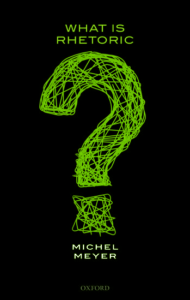 Michel Meyer is known as the father of problematology. How did his thought influence your own research, during and after your fellowship at the ULB?
Michel Meyer is known as the father of problematology. How did his thought influence your own research, during and after your fellowship at the ULB?
Problematology is an approach that emphasizes the importance of questioning, both in our day-to-day lives and in wider society. Since Parmenides, Western thinkers have been interested in the question of being. The contribution of Michel’s work is to invert this order of priority, by showing how the being of the question must come before the question of being. This insight led him to consider the fundamental role of questioning in all aspects of human enquiry, from philosophy to education, from psychoanalysis to sociology and politics. I was particularly interested in his problematological approach to rhetoric, which defines rhetoric in a very novel way as the negotiation of distance between two interlocutors on a given question. When I arrived in Brussels, Michel was finishing his book, What Is Rhetoric? (OUP, 2017), so these questions were very much on his mind. What has stayed with me most, I think, is problematogy’s integrative view of rhetoric. By viewing all diverse forms of rhetoric in terms of the negotiation of distance on a given question, Michel was able to bring together so many different aspects of human expression, literature, politics, culture, and history, in a way that’s utterly new.
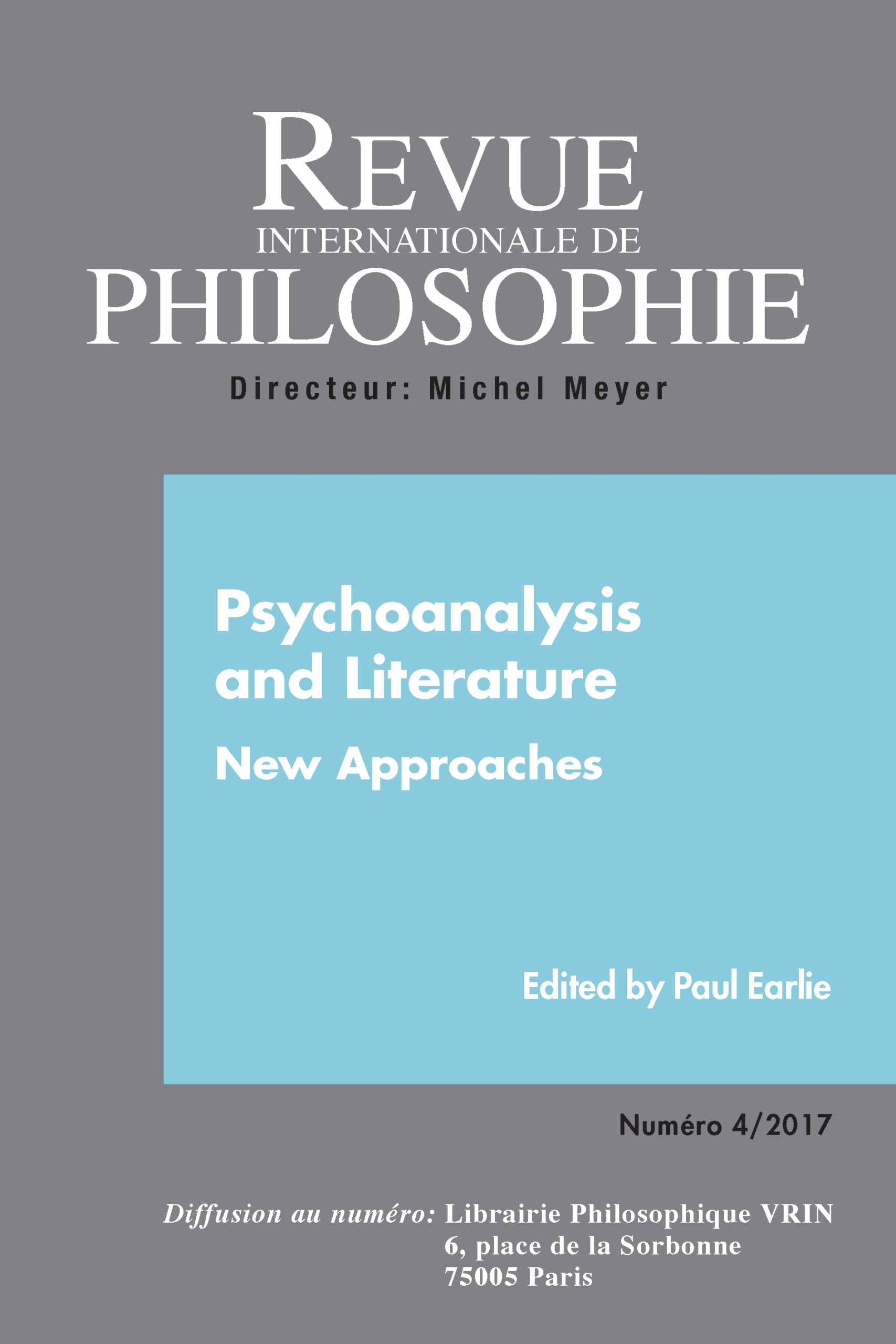 With Michel Meyer, you also deepened the study of the relationship between psychoanalysis and literature. Who were some of the authors you looked into?
With Michel Meyer, you also deepened the study of the relationship between psychoanalysis and literature. Who were some of the authors you looked into?
In Brussels, I began to read work by the Nobel Prize-winning Belgian playwright Maurice Maeterlinck, whose plays are hugely atmospheric and full of emotional intensity and symbolic suggestion. They are less well-known today but were really quite important for later, more experimental forms of theatre. Michel invited me to edit a special issue of the Revue internationale de philosophie on a topic we would often discuss together: the relationship between psychoanalysis and literature. I commissioned articles on a range of new approaches to this question, from Jungian ecocriticism to neuropsychoanalysis. Using the example of Maeterlinck’s plays, my contribution to the issue explores the role of persuasion in the literary text. This role has often been neglected due to the prevailing view that literature is too unstable in its meaning to allow for persuasive effects. I disagree with this: I think that literature is full of arguments, theses, rationalizations. The latter may very often be in competition or contradiction with each other, but they’re still there.
One of your current projects at the University of Bristol is entitled “Intellectuals and the Popular Media in France ». While the link with your research on French thinkers is clear, I was wondering how you came to be interested in the media sphere? Did one author in particular inspire you?
It really arose out of my interest in the reception of French thought in the twentieth century and beyond. I am always surprised by the caricatures of many influential French thinkers – whose works are still amongst the most cited in the humanities today – as figures who are willfully obscure, incapable of speaking in a language that’s simple and clear or of reaching out to non-academic audiences. Derrida, in particular, suffered from these kinds of clichés, particularly during more controversial moments of his career, such as his award of an honorary doctorate from the University of Cambridge in 1992. These negative stereotypes pushed many thinkers, including Derrida, to engage with the mass media, with radio, television, and more recently the internet and social media. In France, intellectuals continue to occupy a uniquely central place in the media, which is not the case in other countries, such as the United Kingdom or the United States. What I’m trying to do in my new project is to challenge perceptions that the mass media are intrinsically anti-intellectual modes (of ‘dumbing down’, for example) by looking at how public intellectuals in France have tried to work with radio, TV, and social media. I think we can learn lots of lessons from their openness to these more popular forms, at a period when genuine debate in the public sphere seems less possible than ever.
So you have also been analyzing the specific role of social media in hosting and promoting intellectual debates?
Yes, more recently I’ve been turning my attention to the role of social media, which often get the blame for inflaming or impoverishing discourse in the public sphere. In fact, when you look at earlier periods of rapid media transformation, such as at the end of the nineteenth century or the popularization of television in the 1950s, you’ll find strikingly similar anxieties to those expressed today: concerns over disinformation, lack of concentration, declining standards of education, and so on. I’ve been looking, by contrast, at how a new generation of intellectuals in France have been using social media platforms like Twitter and Instagram in innovative ways, as tools for democratization and encouraging critical debate, rather than just instruments of self-promotion or ‘clickbait’.
Would you like to share a personal memory of Michel Meyer or an advice he gave you when you worked together?
Michel imparted so much advice to me over the years I would find it really hard to pick just one nugget of wisdom… In some ways, I think I learned the most from his general practice. Although his energy was legendary and he left behind him a hugely impressive body of work, he was not what we would call a ‘workaholic’. He always made time for rest and relaxation, whether over a coffee at the Salle des profs at the ULB or over lunch at a restaurant. He would have hated the term ‘work-life balance’ but he was certainly a devotee of the concept, and his work never suffered for it. That’s really a very valuable lesson, I think.
Cet entretien est d’abord paru dans notre Rapport d’activités 2022.


